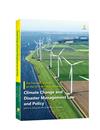圖書名稱:The Proceeding Series on the 2019 East Asia Forum on Climate Change and Disaster Management Law and Policy
The climate change has raised exceptional attention globally for the vulnerability toward the extreme weathers that threatening lives and property. Such adaptation would require holistic solutions from vital stakeholders consist of government, enterprises, technology, and community to build resilience for the betterment of governance. This book is the first publication initiative of the Proceeding series of the East Asia Forum on Climate Change and Disaster Management Law and Policy since 2015, which reflects timely trend of climate change responsive policy and law formation from cases of US, Japan, Korea, Malaysia and Taiwan with enlightenments of comparative studies. The ocean risk was also highlighted through the introduction of an effective plastic debris management contributed by partnership between private and public sectors, along with the illustration for risk financing. Readers could be granted with interdisciplinary approaches to tackle various climate change law and policy issues to stand with the specialists at the frontier.
作者簡介:
編者簡介
Dr. Hsing-Hao Wu
Associate Professor in Law, School of Law, National University of Kaohsiung (NUK), Taiwan
Director, International Relation Research Center, NUK
Dr. Michael C. Huang
Research Fellow, Ocean Policy Research Institute (OPRI), The Sasakawa Peace Foundation, Japan
Visiting Scholar, SciREX Center, National Graduate Institute for Policy Studies (GRIPS)
作者序
序
Preface
As the human-induced global warming effects cannot be effectively controlled, the extreme weather events caused by the rising global average temperature, such as long-term drought, heat waves, heavy rains and hurricanes, has become more and more frequent, causing major disaster losses and casualties around the world. In the face of the challenges of global climate change, after decades of struggle, the international society finally reached the Paris Agreement (Paris Agreement) in the 21st Conference of the Parties (COP21) of the United Nations Framework Convention on Climate Change (UNFCCC) held in Paris on December 12, 2015. The Paris Agreement requires contracting parties to control the increase of global average temperature within 2 degrees Celsius compared to the average earth temperature before the industrial era, and should strive to reduce the global warming to within 1.5 degrees Celsius. Compared with the previous binding Kyoto Protocol, all parties are bound to reduce GHGs emission including developing countries such as the China and the India. Countries are required to submit its Intended Nationally Determined Contributions (INSCs) according to their own economic and social development status. There are currently 165 countries or regions that have submitted the INDSCs to the UNFCCC Secretariat. UNFCCC Secretariat will then review the INDCs submitted by countries and the effectiveness of their implementation in every five-year cycle.
In the face of global climate change, the extreme weather events have resulted in numerous cluster disasters worldwide. East Asia is deemed one of the most vulnerable regions on Earth to the impacts of global warming. Many countries in East Asia regions, such as the Taiwan, Japan, Korea, Philippines and other Southeast Asia States are particular vulnerable to extreme weather events such as typhoons and torrential rains. Heavy rainfall frequently resulted in urban flood and landslides disaster in mountainous areas among aforementioned countries. The frequent occurrence of extreme weather events as a result of uncontrollable climate change will thus increase the risks for occurring large scale natural disasters in East Asia, such as severe flood, landslide, and drought and the risks of large-scale disasters are increasing year by year. For instances, on November 8, 2013, the typhoon of Yolanda hit the central Philippines. In accordance to official statistics, more than 6,100 people were killed and nearly 10 million people were affected. Typhoon Maleka in 2016 caused more than 720,000 households in southern Taiwan were cut of water supply and electricity, and urban areas in Kaohsiung City were heavily flooded. The typhoon of Maleka also caused 2.48 million people in the five provinces of Shanghai, Jiangsu, Zhejiang, Fujian and Jiangxi to be affected by the disaster. 29 deaths and 15 people were missing, and the economic losses exceeded the severe damage of 21 billion yuan. On October 5, 2016, the typhoon of Siam seriously affected the Jeju Island in South Korea and the southern part of the island, causing dozens of flights to be cancelled in the area. The floods caused the urban streets flowed into the river affected 49,000 households. The production line of the modern automobile factory in Ulsan was completely interrupted. From July 5 to 13, 2017, the northern part of Kyushu, Japan, was hit by record-breaking heavy rains on the 5th. During this period, continuous heavy rains caused 29 people to die, 20 people were missing, and more than 1,300 people lived in shelters. From July 3 to 8, 2018, heavy rain hit the West Japan, causing earth and stone floods and floods in many areas, causing more than 500 houses to be destroyed, at least 46 people were killed and 47 people were missing. In addition to torrential rains, the global temperature rise has also caused successive droughts in many countries such as in India and Cambodia. It caused severe wildfires and forest fires in California's and even in Gangwon Province, Korea, in April 2019. Forest fires in Gangwon caused serious disasters in which hundreds of houses were burnt down and tens of thousands of people were forced to evacuate.
In order to meet the global extreme climate challenges and implement the United Nations Sustainable Development Goals (SDGs) which had been established since 2015, the development of climate change adaptation strategies such as land planning, forest conservation, coastal management and urban development and utilization of green energy is of paramount importance. It is thus critical to conduct comparative study on climate change law and policy and their implementing experience in vulnerable regions such as the East Asia. A comparative study concerning the countermeasures for large-scale disasters, law and policies to promote resilience cities or green energy, water and ocean governance, and the future promotion of relevant legislation in mitigating the adverse effects as result of climate change are thus worth to explore and exchange views. In view of the resounding response of the First “East Asia Forum on Climate Change Adaptation and Disaster Management Law and Policy” host by the International Relation Research Center, National University of Kaohsiung in June, 2015. The 2015 Forum successfully promoted the joint research and experience exchange network related to the resilience capacity construction and disaster management legal system in East Asia.
Times Higher Education (THE) recently released its ranking results of 2019 Global Impact Universities Rank, National University of Kaohsiung (NUK), the host university of the Climate Change Law and Policy Forum was ranked Top 300 overall in the world. NUK is also ranked 56th globally by for “Best Young Universities 2019.” In achieving the NUK’s ambition goals for connecting teaching and research in meeting SDGs, the International Relation Research Center of NUK once again organized and hosted the “Second East Asia Climate Change Adaptation and Disaster Management Law and Policy Forum,“ which took place at School of Law, NUK on October 17-18, 2019.
Recognizing the imminent threats of marine ecological conservation as a result of climate change, and in response to the Paris Agreement's INDCs targets submitted by East Asia countries, regulation and policy concerning the renewable energy development to achieve United Nations Sustainable Development Goals (SDG). Goal 7 (Affordable and Sustainable Energy), Goal 11 (Permanent Urban Communities), Goal 13 (Climate Action), and Goal 14 (Marine Ecology Resource Conservation) are related to climate change responsive actions. The 2019 2nd East Asia Forum on Climate Change Adaptation and Disaster Management Law and Policy invited scholars and practitioners from the United States, Japan, South Korea, Malaysia, Philippines, and Taiwan to explore and exchange researches findings concerning the recent law and policies development in the context of climate change response, energy transition, marine conservation, and disaster management meeting the aforementioned SDGs Goals. The Forum explores the climate change adaptation and renewable energy development in the East Asian region through the senior scholars and experts from East Asia and the advanced co-promotion from the industry and academia.
This publication comprises with presentation of the invited guest speakers attended in the 2019 Forum, as the completion output. The academic backgrounds of these chapter authors are ranging from laws, economic, political science, and marine engineering scholars and experts from Taiwan, United States, Japan, Korea, Malaysia, and Philippines. The themes of the publication are ranging from SDGs actions at various levels, energy transition backgrounds and renewable energy law development in East Asia countries, water and ocean governance in the face of climate change, and potentials of using impact investment as green financial instruments. The chosen theme reflects the current emphasis and pressing needs to address issues relating to sustainable development goals (SDGs). The SDGs addresses the various emerging global issues, climate actions, environmental degradation, and sustainable society are among them. The 2019 Forum and this publication both aim to discuss the important role of law and policy in providing concrete solutions to ensure the successful achievement of SDGs in the face of climate change from law, policy, and technological perspectives. We wish our small endeavors may attract attentions from the academic as well as governments in the East Asia region to initiate further regional cooperation in the context of climate change actions, ocean governance, and energy transition development.
Hsing-Hao Wu, Ph.D.
Associate Professor & Director of
International Relation Research Center
National University of Kaohsiung
Michael C. Huang, Ph.D.
Research Fellow,
The Ocean Policy Research Institute,
The Sasakawa Peace Foundation
序
Preface
As the human-induced global warming effects cannot be effectively controlled, the extreme weather events caused by the rising global average temperature, such as long-term drought, heat waves, heavy rains and hurricanes, has become more and more frequent, causing major disaster losses and casualties around the world. In the face of the challenges of global climate change, after decades of struggle, the international society finally reached the Paris Agreement (Paris Agreement) in th...
目錄
Forewords
Jiunn-rong Yeh i
Tseming Yang. iv
Tomonari Akamatsu vi
Preface ix
Related Actions by Taiwan’s Public and Private Sectors to Promote UN SDGs Chih-Wei Chen 001
PART I ENERGY TRANSITION IN THE FACE OF CLIMATE CHANGE
A Comparative Legal and Policy Development of Renewable Energy in Taiwan, Korea, and Japan Hsing-Hao Wu 015
Recent Development in U.S. Climate Change and Renewable Energy Law & Policy Tseming Yang 047
Introduction of Floating Offshore Wind Power in Japan Jun Kunitsugu 065
PART II OCEAN AND WATER RESOURCE GOVERNANCE IN THE FACE OF CLIMATE CHANGE AND OCEAN RISK
Effective Water Governance for Climate Change Adaptation and Mitigation Rasyikah Md Khalid 089
The Impact Assessment and Resilience Toward Tsunami Risk: A Recursive General Equilibrium Analysis on Hakodate City Hajime Tanaka and Michael C. Huang 115
Facilitating Climate Change Adaptation Through Impact Investing Nagisa Yoshioka 143
Communication Tools Emerging out of Dialogue Between Companies and Communities to Develop the Plastic Waste Management Activities Tomo Shioiri、Yumi Akasaka 171
Forewords
Jiunn-rong Yeh i
Tseming Yang. iv
Tomonari Akamatsu vi
Preface ix
Related Actions by Taiwan’s Public and Private Sectors to Promote UN SDGs Chih-Wei Chen 001
PART I ENERGY TRANSITION IN THE FACE OF CLIMATE CHANGE
A Comparative Legal and Policy Development of Renewable Energy in Taiwan, Korea, and Japan Hsing-Hao Wu 015
Recent Development in U.S. Climate Change and Renewable Energy Law & Policy Tseming Yang 047
Introduction of Floating Offshore Wind Pow...












